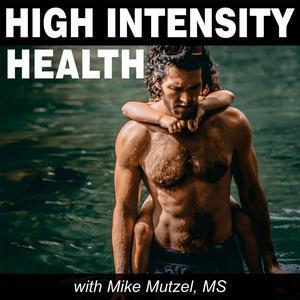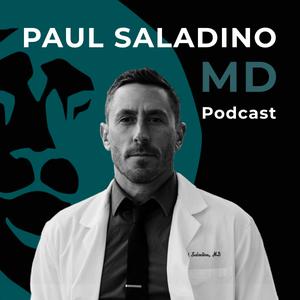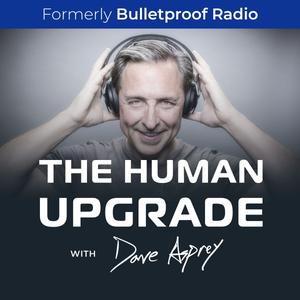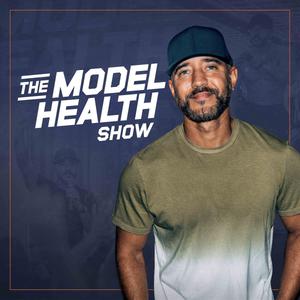
High Intensity Health with Mike Mutzel, MS
Author Mike Mutzel interviews Jeff Bland, Datis Kharrazian, Ben Greenfield, Abel James, Dave Asprey, Ben Lynch, Jade Teta and Corey chuler
- 12 minutes 42 secondsHalf of Cancer Deaths Are Preventable with These Lifestyle Changes
A new study finds over 40% of cancer deaths in the US are preventable through lifestyle changes such as reducing smoking, alcohol consumption, and obesity, while promoting exercise and a healthy diet, with a specific focus on the protective benefits of exercise for women against breast cancer.
Sponsored:
Support your Intermittent Fasting lifestyle with the updated Berberine Fasting Accelerator by MYOXCIENCE: https://bit.ly/berberine-fasting-accelerator Use code podcast at checkout to save
Link to Video and Show Notes: https://bit.ly/3zWVUUb
Research Mentioned:
Islami, F. et al. Proportion and number of cancer cases and deaths attributable to potentially modifiable risk factors in the United States, 2019. CA: A Cancer J. Clin. (2024) doi:10.3322/caac.21858.
Key Takeaways:
CNN Article Overview (00:53):
Specific Risk Factors (01:46):
Cancer Prevention Strategies (02:48):
Role of Exercise (04:25):
2019 Study Findings (06:15):
Alcohol Consumption Impact (10:07):
Diet and Cancer Risk (10:59):
Conclusion (11:53):
26 July 2024, 7:20 pm - 22 minutes 16 secondsBeyond LDL-Cholesterol: These Culprits Drive Artery Plaque Build Up
For the past 60 years the medical community has obsessively focused on lowering LDL-cholesterol levels…
Research shows these five preventable health conditions make LDL-Cholesterol more likely to cause artery plaque build-up, even if your LDL-Cholesterol levels are low.
Sponsored:
Crush your Workouts and stay hydrated this summer with the Electrolyte + Creatine Combo by MYOXCIENCE: https://bit.ly/electrolyte-stix
*Save with code podcast at checkout
Link to Video and Show Notes: https://bit.ly/3WfpI5R
Research Mentioned:
Zanoni, P., Velagapudi, S., Yalcinkaya, M., Rohrer, L. & Eckardstein, A. von. Endocytosis of lipoproteins. Atherosclerosis 275, 273–295 (2018).
Ference, B. A., Braunwald, E. & Catapano, A. L. The LDL cumulative exposure hypothesis: evidence and practical applications. Nat. Rev. Cardiol. 1–16 (2024) doi:10.1038/s41569-024-01039-5.
Time Stamps:
00:45 LDL's link with atherosclerosis is nuanced.
02:30 Initial damage to the arterial wall makes LDL levels problematic.
03:45 Increases risk of arterial wall damage: elevated blood pressure, insulin resistance/diabetes, smoking/vaping, obesity, elevated blood viscosity, consuming oxidizableoils.
08:40 High LDL and high triglycerides suggest insulin resistance and increased cardiovascular risk.
09:50 Start with diet and exercise together.
11:20 Statins have concerning side effects.
13:15 Plaque formation begins early in life.
13:50 High LDL is found in centenarians.
14:44 Centenarians are metabolically healthy.
15:40 Your liver makes LDL cholesterol.
16:10 Every cell in your body requires cholesterol.
18:00 Diets high in seed oils make your LDL more likely to be oxidized.
20:55 30-50% of people who have heart attacks have optimal serum cholesterol.
19 July 2024, 10:11 pm - 10 minutes 9 secondsScience Behind Vitamin D and A Synergy
New research suggests vitamin D and A work better when they're taken together. Here's more food for thought...
Support your Vitamin D, K2 + A Health with this combo by MYOXCIENCE: by MYOXCIENCE: https://bit.ly/vitamin-d-k-2-blend *Save with code podcast at checkout
Link to study: https://medicinskiglasnik.ba/article/36
------------Show Notes-------------------------
0:00 Intro 0:20 Vitamin D receptor binding requires vitamin A. 0:50 Retinol is found in animal-based products. Pre-vitamin A is from vegetables. 1:40 Pairing vitamin A and vitamin D supports immune system, brain, and blood sugar health. 2:40 Excessive supplemental vitamin A in pregnant women can affect fetal growth. 4:25 There are fewer micronutrients in your food. 5:45 Paired vitamin D and vitamin A balance the anti-inflammatory mechanisms of the immune system. 7:25 Mike suggests that you supplement with a retinol, not a beta carotenoid version of pre-vitamin A.
13 July 2024, 3:19 pm - 48 minutes 41 secondsVitamin D, Sun Exposure & Testosterone w/ Mark Bell + Nsima Inyang
Mark Bell and Nsima Inyang delve into the transformative benefits of sunlight and outdoor activity for enhancing hormone levels, accelerating fat loss, and improving overall health.
Crush your Workouts and stay hydrated this summer with the Electrolyte + Creatine Combo by MYOXCIENCE: https://bit.ly/Electrolyte-Stix-Jar *Save with code podcast at checkout
Save on the Bon Charge PEMF Devices: https://boncharge.com/hih
Link to Video Interview: https://youtu.be/mX3Mt5glQKY
Time Stamps
0:00 Intro 2:30 Exercise snacks 4:30 Cardio helps you get shredded 5:30 Movement between sets 7:30 Exercise capacity 8:22 Fat loss and diet 10:40 How Nsima stays shredded 12:17 Cycling Carbs 13:26 Calories VS Carbs 15:45 Protein for muscle gain 18:00 How much protein do you need 19:41 Red meat VS Fish VS Chicken 25:00 Cheat meals 27:00 the power of being outside
5 July 2024, 5:45 pm - 7 minutes 25 secondsMicoplastics Stored in the Penis, Linked to Erectile Dysfunction (STUDY)
A recent study has revealed the presence of microplastics in the male penis, linking these particles to erectile dysfunction.
Crush your Workouts and stay hydrated this summer with the Electrolyte + Creatine Combo by MYOXCIENCE: https://bit.ly/Electrolyte-Stix-Jar *Save 50% the second bottle code BOGO50 at checkout
Link to Studies and Show Notes: https://bit.ly/3L3AGGn
Save on the Bon Charge Red Light Therapy Devices: https://boncharge.com/hih
--------------Show Notes----------------------------
0:00 Intro 0:05 microplastic particles make their way to the male penis 0:49 study detected microplastic particles 1:46 microplastic particles in the carotid artery plaque 2:12 microplastics and erectile dysfunction 3:55 Study Title 4:11 Top prevention tips 4:58 face masks and microplastics 6:18 small plastics still absorbed 6:37 Key ways to avoid
27 June 2024, 7:06 pm - 56 minutes 17 secondsPeptides for Growth Hormone + Hormonal Balance w/ Dr. Elan Zinkov
Dr. Zinkov discusses ways to use peptides therapeutically to improve tissue rejuvenation and repair, promote longevity, enhance muscle growth, and boost mood, vitality, and libido. She discusses the benefits and risks, sourcing, dosages, cycling, administration routes, and how they work in combination w/ hormone optimization.
Support your Workout Sessions and Healthy Hydration with the Electrolyte + Creatine Combo by MYOXCIENCE: https://bit.ly/electrolyte-stix *Save 12% with code podcast at checkout
Link to Video, Show Notes and Research: https://bit.ly/4bcEks6
Show Notes:
02:45 Peptides stimulate your endogenous production of growth hormone.
03:10 Sermorelin does not increase growth hormone beyond super physiologic levels.
04:35 Peptides can improve hormone health, longevity, reverse aging-related processes of inflammation and injury recovery.
08:45 Growth hormone improves cell function.
11:05 Sermorelin stimulates growth hormone secretion for about 12 minutes.
12:30 Growth hormone peaks are nighttime and post-workout.
14:30 Symptoms of suboptimal growth hormone.
15:45 IGF-1 is a biproduct of growth hormone breakdown.
18:30 Additional strategies.
22:05 Poor diet and lifestyle choices reduce growth hormone.
25:10 Women in their teens and 20s may have suboptimal production of hormones.
30:30 Progesterone receptors can be stimulated with herbal treatments.
31:30 Xenoestrogens cause more disruptive receptor stimulation.
33:15 Obesity is one of the biggest risk factors for breast cancer.
34:30 Growth hormone stimulates collagen production.
37:15 Low dose Rapamycin slows the aging process.
40:30 Methylene Blue has been used as a nootropic.
43:55 Nicotine directly and quickly stimulates the vagal nerve.
53:00 Growth hormone does not cause cancer.
21 June 2024, 10:08 am - 10 minutes 20 secondsSkipping Breakfast & Weight Gain: The Surprising Link Exposed
The relationship between breakfast, sleep, and weight is complex. While skipping breakfast has been traditionally linked with weight gain, new evidence emphasizes the critical role of adequate sleep in maintaining a healthy weight. By focusing on good sleep hygiene and balanced nutrition, individuals can better manage their weight and overall health.
Support your Intermittent Fasting lifestyle with the updated Berberine Fasting Accelerator by MYOXCIENCE: bit.ly/berberine-fasting-accelerator Use code podcast at checkout to save
Research Mentioned: Yang, W. et al. Short sleep time may be the main reason for irregular breakfast to cause overweight—a cross-sectional study. Front. Nutr. 11, 1310155 (2024).
Time Stamps:
00:00 Irregular breakfast eaters have increased body mass indexes.
01:00 Food influences your circadian clock system like light does.
02:00 Change of energy balance is one cause of overweight.
02:15 Irregular meal timing perturbs your circadian rhythm.
04:10 Time eating and exercise consistently.
05:45 Regular breakfast eating habits (eating or not eating) are linked to lower body mass index.
06:45 Exercise outdoors.
07:20 Regular exercise impacts sleep.
08:30 Irregular sleep duration and timing influences irregular feeding timing.
5 June 2024, 11:04 pm - 14 minutes 27 secondsInsulin Resistance Fuels Artery-Clogging Plaque, Early Atherosclerosis
A new study finds insulin resistance and reduced glucose uptake in the heart is linked with early-onset atherosclerosis and heart issues.
Sponsored:
Support your Workout Sessions and Healthy Hydration with the Electrolyte + Creatine Combo by MYOXCIENCE: https://bit.ly/electrolyte-stix *Save 12% with code podcast at checkout
Link to Video and Research: https://bit.ly/3UXLhal
Research Mentioned:
Devesa, A. et al. Cardiac Insulin Resistance in Subjects With Metabolic Syndrome Traits and Early Subclinical Atherosclerosis. Diabetes Care 46, 2050–2057 (2023).
Time Stamps:
00:00 FDG = Fluorodeoxyglucose
00:30 Reduced glucose uptake in the heart is tethered to atherosclerosis.
01:20 LDL levels are not strongly associated with poor outcomes.
02:00 Your heart becomes insulin resistant.
03:05 Those with no glucose uptake in the heart had higher fasting glucose.
03:45 Those with more cardiovascular risk factors had lower LDL.
04:35 The heart can generate energy from fatty acids, carbs, and ketones.
05:00 Cardiac abnormalities are associated with metabolic syndrome.
07:00 Insulin resistance changes muscle and heart muscle.
09:16 Insulin resistance is associated with a progressive decrease of myocardial FDG uptake.
09:50 Cardiovascular risk increases with the decline of FDG uptake.
11:30 Your heart loses the ability to pump blood effectively as it loses ability to utilize different energy substrates.
12:40 Support your heart by supporting your metabolism.
25 May 2024, 4:50 pm - 15 minutes 31 secondsWalking 8,000 Steps Daily Reshapes Your Body
New studies show sedentary individuals don't experience significant increases in fat oxidation with acute exercise, but those who maintain higher step counts exhibit notable health improvements, including reduced triglycerides and blood lactate levels.
With an optimal step count of 8600 steps per day, the episode highlights the serious health risks associated with chronic inactivity.
Sponsored:
Support your Workout Sessions and Healthy Hydration with the Electrolyte + Creatine Combo by MYOXCIENCE: https://bit.ly/electrolyte-stix
*Save 12% with code podcast at checkout
Link to Video and Studies: https://bit.ly/3yqdHlM
Key Takeaways:
00:00 If you are sedentary, it is hard to burn fat during exercise.
01:10 Move throughout the day.
02:05 Exercise inactivity is the 4th leading cause of death.
03:30 If you are sedentary, an acute round of exercise does not increase fat oxidation.
04:30 Triglycerides were lower by 27% in the high step count group.
09:20 Blood lactate is reduced by 11% in the high step count group.
10:00 Fat oxidation increases with the higher step count.
11:10 Optimal step count is 8600/day or more.
12:00 Atherosclerosis is impacted by chronic inactivity.
12:45 Brain health is impacted by chronic inactivity.
13:00 Intermittent exercise does not mitigate chronic inactivity.
20 May 2024, 8:59 pm - 15 minutes 11 secondsHigher LDL-Cholesterol Tied to Lower Risk of Death
A 22-year follow-up study involving 177,000 individuals reveals that low LDL cholesterol is associated with higher cardiovascular-specific mortality.
The authors of this study write, "...the lowest risk for long-term mortality appears to exist in the wide LDL-C range of 100–189 mg/dL, which is much higher than current recommendations."
Support your Intermittent Fasting lifestyle with the Berberine Fasting Accelerator by MYOXCIENCE: bit.ly/berberine-fasting-accelerator Use code podcast at checkout to save
Links to Research & Video: https://bit.ly/4asJ4t3
Key Takeaways:
0:00 Intro 0:04 22 Year Study 0:22 Study Title 0:52 Study Findings 1:52 Probability of survival 2:12 Counterintuitive Findings 3:42 High LDL and odds of death 3:59 U-Shaped Curve 5:50 Metabolic Health 6:34 Study of 177,000 people 8:09 Lowest risk of mortality 9:17 Watch this! 11:01 Lipid paradox
15 May 2024, 9:49 pm - 14 minutes 4 secondsCancer Rates Soar Among Young Adults: Accelerated Biologic Aging
Younger generations are facing higher cancer risk due to accelerated biologic aging, new study finds.
Support your Intermittent Fasting lifestyle with the Berberine Fasting Accelerator by MYOXCIENCE: bit.ly/berberine-fasting-accelerator Use code podcast at checkout to save
Link to Show Notes: https://bit.ly/3UUQVvb
Key Timestamps:
0:00 Intro
0:07 The rise in cancer
1:13 Cancer and Biologic aging
1:47 High profile cancer case in young people
2:12 Biomarkers that predict cancer
2:49 Berberine for food cravings
3:49 New Study
5:02 Low Albumin
6:00 Creatinine
7:04 Glucose
8:16 MCV and MCH
8:50 Inflammation and high WBC
11:11 Preventing cancer
12:30 Metabolic Health
10 May 2024, 7:39 pm - More Episodes? Get the App
Your feedback is valuable to us. Should you encounter any bugs, glitches, lack of functionality or other problems, please email us on [email protected] or join Moon.FM Telegram Group where you can talk directly to the dev team who are happy to answer any queries.
 The Genius Life
The Genius Life
 Paul Saladino MD podcast
Paul Saladino MD podcast
 The Dr. Gabrielle Lyon Show
The Dr. Gabrielle Lyon Show
 Ben Greenfield Life
Ben Greenfield Life
 The Human Upgrade with Dave Asprey
The Human Upgrade with Dave Asprey
 The Model Health Show
The Model Health Show